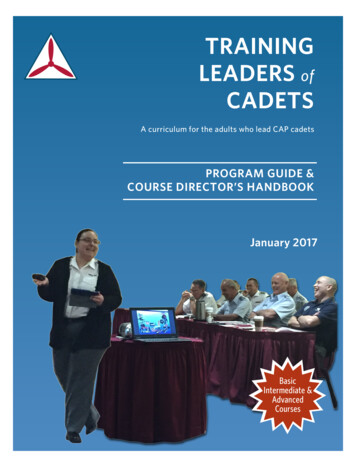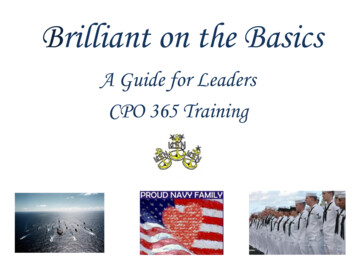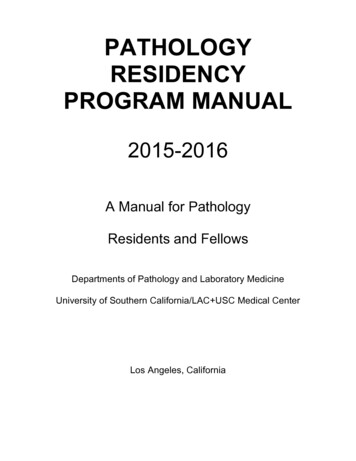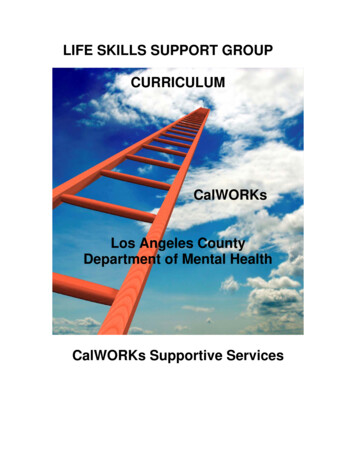
Transcription
Leaders’ Training ManualHope Church, CorbyAn Elim Pentecostal Church. Registered Charity no. 251549
1
Leaders’ Training Manual ContentSession 1 – Why Life Groups?Part A: The biblical basis for Life Groups God in communitySmall groups in the Old TestamentSmall groups in the New TestamentSmall groups in Church historyPart B: The centrality of Life Groups in Hope Church Keeping the main thing, the main thing – the ‘D’ wordThe 5 aims of Life GroupsThe 5 values of Life GroupsSession 2 - LeadershipPart A: The heart of a leader It all starts in the heartA leader who me?A few last thoughtsPart B: The role of a Life Group leader Share the vision: know where you’re goingFacilitate Body ministryBuild away from yourselfBe enthusiasticPrepare wellEmbed the 5 ‘aims’ and the 5 ‘values’Be a pastorRaise up JoshuasPlan to grow and reproduceSession 3: PracticalitiesPart A: The group gathering Creating the right environmentDelegate tasksSetting boundariesManaging group dynamicsPart B: Effective Bible study The importance of studying the BibleC.O.M.A.Asking good questionsApplication questions that hit the mark2
Session 1:‘Why Life Groups?’3
Part A: The biblical basis for Life GroupsQ: What is the point of having Life Groups?God created us for relationships‘Faith is always personal, but never private.’ (Jim Wallis)God is relational. Within the Godhead, we see the most perfect expression of community: Father, Son& Holy Spirit in perfect fellowship and constant, loving communion. He doesn’t need anything oranybody to make Himself complete; He created humanity for His glory, not because He was lonely. Yet,it is clear throughout the Bible, as it records His dealings with those He created, that He delights in Hischildren (Zeph 3:17; Psalm 147:11) and seeks to be in fellowship with them. The Gospel is all about how,through Jesus, our broken relationship with God has been restored (2 Cor 5:18-19). He took the initiativebecause He loves us and wants to be in relationship with us.We are made in God’s image so it is not surprising that we are also relational beings. In the beginning,God saw that Adam was on his own and said that it was, ‘not good’ for him to be alone (Gen 2:18), somade him a companion, Eve. Our desire to be in relationship with others is God-given and flows directlyfrom the heart of God. Broken relationships, isolation and loneliness are the biggest cause ofunhappiness and depression in our world today.Old Testament small groupsGod made a covenant with the Hebrew people and made the following promise: ‘I will take you as myown people, and I will be your God.’ (Exodus 6:7) These people were chosen to reflect God’s glory to theworld and be a model for Kingdom life here on earth. Although the Israelites didn’t always do a goodjob of reflecting God’s glory, we can still see principles that God put in place for how Kingdomcommunity should work.4
Nation, tribes, clans & familiesThe people of God were vast in number but were organised into smaller groups: the nation was dividedinto twelve tribes; the twelve tribes were sub-divided into clans (groupings of several families); andwithin each clan was the single family unit.1000s, 100s, 50s & 10sWhen Moses’ father-in-law, Jethro, came to visit on one occasion, he saw that Moses was trying toprovide direct leadership to the whole nation. This left many people feeling frustrated and most likelyleft Moses feeling burned-out! Jethro made the inspired suggestion that Moses should organise thenation into smaller grouping for accountability and place trustworthy leaders over groups of 1000s,100s, 50s and 10s (Exodus 18:13). This is what happened and things changed for the better.Jesus & the Disciples as a small groupJesus took the most unlikely bunch of men – fishermen, political activists and a tax-collector (amongstothers) – and shaped them into Kingdom-advancing, Spirit-filled, good news-sharing world-changers!Most people would have written them off but Jesus looked past the reputation and outward appearanceand saw their God-given potential. How did He draw that potential out? He took a risk, brought themclose and poured His life into them. They shared their lives together: Jesus laughed, cried, walked, talkedand ate with them. He showed them what Kingdom ministry looked like as he preached the Gospel,healed the sick, cast out demons and raised the dead. He then gave them a go! Finally, He handed overthe family business to them (Luke 22:29); before He returned to the Father He commissioned them togo to the ends of the earth. Filled with the Spirit at Pentecost, this unlikely bunch of misfits began toturn the world upside down in His name!It all happened in community. Large crowds followed Jesus; of those who followed, some believed; ofthose who believed, He chose twelve to be with Him; of those twelve, He gave priority to three (Peter,James & John), who He allowed closer to share unique insights and experiences. This pattern ofcommunity living was adopted by the apostles as they brought around them significant people who theywould also pour their lives into.Small groups in the early ChurchActs 2 records the community life experienced by the early church. This was still a raw, immature church.They had no buildings, no sound system, no multimedia projector and no website. They had no officialrecognition by the State and had no political influence. They experienced all the problems you wouldexpect when a diverse group of people share life together yet the quality and simplicity of their lifetogether is truly breath-taking (vs42-47):‘They devoted themselves to the apostles’ teaching and to fellowship, to the breaking of bread andto prayer. Everyone was filled with awe at the many wonders and signs performed by the apostles.All the believers were together and had everything in common. They sold property and possessions5
to give to anyone who had need. Every day they continued to meet together in the temple courts.They broke bread in their homes and ate together with glad and sincere hearts, praising God andenjoying the favour of all the people. And the Lord added to their number daily those who werebeing saved.’Big and small at the same timeImagine the Holy Spirit being poured-out at Pentecost and 3000 being added to the church in Jerusalemthat day. Allowing for the fact that some, who were visiting Jerusalem for the festival, would returnhome, there was still a logistical problem. How would these new believers grow in their new-found faithas part of the Jerusalem family of believers? The answer seems to be in v46. They met together in thetemple courts (for large gatherings of the whole church) and also in each other’s homes (smaller, moreintimate gatherings of a few believers). They were a big church that expressed community in smallgatherings in homes.New Testament examplesThese are some examples in the New Testament of small church gatherings in homes:‘You know that I [Paul] have not hesitated to preach anything that would be helpful to you but havetaught you publicly and from house to house.’ (Acts 20:20)‘After Paul and Silas came out of the prison, they went to Lydia’s house, where they met with thebrothers and sisters and encouraged them. Then they left.’ (Acts 16:40)‘Greet Priscilla and Aquila, my co-workers in Christ Jesus. They risked their lives for me. Not only Ibut all the churches of the Gentiles are grateful to them. Greet also the church that meets at theirhouse.’ (Romans 16:3-5 – see also 1 Corinthians 16:19)‘To Philemon our dear friend and fellow worker— also to Apphia our sister and Archippus our fellowsoldier—and to the church that meets in your home ’ (Philemon 1:1-2)The ‘one-anothers’ of the BibleThe Church is the Body of Christ here on earth and is called to be like Him, living out His will and purposesuntil He returns. As we love each other deeply and express the same kindness, grace and generosity toone-another that Jesus showed to us, it creates hunger in a love-starved world. There is no morepowerful witness that genuine, self-giving love! A simple word study in the Bible of the phrase ‘oneanother’* shows the depth and quality of love that God wants to see amongst His children. It is hard tolive this out in the context of large Sunday gatherings, where conversations are fleeting and there areso many people to see. It’s only when we gather in smaller settings on a regular basis that we can morepurposefully share our lives, build relationships of trust and act like family.(*See Appendix 1 for a list of the ‘One Another’ commands in the Bible)6
Small groups in Church historyIn the Middle Ages, St Francis of Assisi gathered Christians together in small groups for prayer and study.Various sections of the Anabaptist movement in Europe formed dynamic small groups that met inhouses. The Hutterites in Moravia, Southern Germany, lived out radical community life using a smallgroup model. The Lutherans also used small groups for nurturing.By far the best known example of small groups in recent Church history was in the movement foundedby John Wesley. Wesley organised Christians into small groups called ‘Bands’ and hundreds of thousandsof Christians were nurtured in this way. This method of discipleship became known as Methodism.Having seen their effective use by the Moravians, Wesley introduced small groups to provide anopportunity for mutual confession one to another (based on James 5:16), and to give encouragementand support in living wholeheartedly for Christ. John Wesley is often referred to as the Father of modernsmall groups.7
Part B: The centrality of LGs in Hope ChurchQ: Why do you think the ‘One Another’ commands areexpressed most effectively in small groups?The ‘D’ word keeping the main thing, the main thing!The Great Commission (Matthew 28:16-20) is global in its scope but personal in its outworking. Jesustold the disciples to go and ‘make disciples’ – that is still the heart of God’s strategy for revealing hisglory throughout the earth. A disciple is someone who follows, learns-from and increasingly becomeslike their Rabbi [Jesus] over time. So our job in making disciples is to help people find faith and then towalk with them on their journey towards maturity in Christ – the journey from spiritual infancy tospiritual adulthood. In addition to laying doctrinal foundations, that involves setting an example andshowing people how to bring God into every area of life: marriage, parenting, friendships, work,finances, ministry etc. We express it in Hope Church like this:‘We want to see peoplemoving Towards Jesus:passionate disciples inloving community,living missionally.’8
So the main thing is GROWING AS DISCIPLES!Life Groups provide an excellent environment where Christians can experience genuine biblicalcommunity and encourage one-another on their journey of faith. So we encourage everyone in thechurch to join a Life Group to help them grow as disciples of Jesus.TheAIMS of Life GroupsOur Life Groups are as diverse as the people in the church but they all share the same common aimsaround the goal of growing disciples of Jesus:1. Growing in COMMUNITY‘They devoted themselves to the fellowship’ (Acts 2:42)2. Growing in PRAYER‘They devoted themselves to prayer’ (Acts 2:42)3. Growing in THE WORD‘They devoted themselves to the apostles teaching’ (Acts 2:42)4. Growing in MINISTRY‘Everyone was filled with awe at the many wonders and signs performed by theapostles they sold property and possessions to give to anyone who had need.’ (Acts2:43-45)5. Growing in MISSION‘ and the Lord added to their number daily those who were being saved.’ (Acts 2:47)9
TheVALUES of Life GroupsWe expect all group members to adopt five basic values:1. CommitmentGroups are most effective when people attend. Group members should try to be at the groupas regularly as possible and get in touch with the leaders when they’re not able to make it.2. ContributionEach group member brings something valuable and unique to the group so everybody isencouraged to contribute. Contributions should always be valued and affirmed in the group.3. ConsiderationNobody in the group should dominate. Nobody should speak or behave in a way that belittlesor dishonours another person.4. ConfidentialityGroups need to be safe places to share where people can be open, honest and accountable.So, in order to build trust to a level where that is able to happen, it is expected that what isdisclosed in the group should stay in the group (unless there are legal implications).5. CareGroups are a great way to express ‘family’ together. They are the main place in Hope Churchto give and receive pastoral care. Group members should look for opportunities to buildrelationships and care for one-another both inside and outside of group gatherings.10
Session 2:‘Leadership’11
Part A: The heart of a leaderThink of a successful leader past or present:Q: What do you admire most about that person?Q: What made them a successful leader?Study the following passages and discuss what they teach about leadersand leadership. Then spend some time answering the questions below:Mark 10:42-45John 21:15-171 Peter 5:1-4Q: What differences should there be between Christianleaders and leaders in the world?What is leadership?A person is a leader when others follow them it’s as simple as that! You don’t need a title to be a leader– in fact, some people with the title ‘leader’ are terrible leaders! John Maxwell has famously definedleadership as ‘one life influencing another.’ To him, the essence of leadership is influence. Using thatdefinition, the goal of leadership must therefore be to influence others to achieve certain outcomes.This kind of influence can clearly be seen in great leaders such as Winston Churchill and Martin LutherKing but it can also be seen in people like Hitler and Mussolini! All were effective leaders in their ownway.So what marks out a Christian leader? My definition of Christian leadership is this:12
‘The exercise of godly influence to inspire and empower people to moveonto God’s agenda.’It all starts in the heartSelf-leadershipBy far the most important (and probably most difficult) part of leadership is self-leadership.On an aeroplane, when the stewards give safety announcements, they always instruct you to use theoxygen mask yourself before giving oxygen to someone else. You first, then others otherwise, you willpass out and be no help to anyone! Before a leader gives out to others on behalf of Jesus, they need tohave spent time with Jesus. To use another analogy, it is possible to drive a car on petrol fumes for awhile but eventually it will break down. We constantly need to be re-filled: spending time in prayer,studying God’s Word, fellowshipping with the Holy Spirit and seeking out life-giving, accountablerelationships.Character over gifting“Talent is a gift, but character is a choice.” (John C. Maxwell)When appointing leaders in the Church, Paul emphasised character over gifting every time (see 1Timothy 3). Gifting is important, but who we are is much more important. God is more interested inwhat’s in our hearts than our talent, competence or experience.When appointing a king to replace Saul, God led the prophet Samuel to the family of Jesse in Bethlehem.When Jesse’s sons were brought before Samuel, the prophet looked at the eldest and, seeing that he13
looked the part, assumed that God would choose him. The Lord, however, was using different criteriafor choosing His leader:‘When they arrived, Samuel saw Eliab and thought, “Surely the Lord’s anointed stands herebefore the Lord.” But the LORD said to Samuel, “Do not consider his appearance or his height, forI have rejected him. The LORD does not look at the things people look at. People look at theoutward appearance, but the LORD looks at the heart.”’ (1 Samuel 16:7)When it became clear that none of the sons that Jesse presented were God’s choice for king, Jesseconfessed that he also had another son. David wasn’t a warrior, he was a shepherd; He was also theyoungest and least noteworthy of the brothers.so who would have chosen him? Samuel had himbrought in and anointed him as the next king of God’s people. God saw what was in David’s heart andknew what kind of man he was even when no-one else had spotted it!Christian leadership starts in the heart.A leader who me?If you are stepping into leadership, you may be feeling a measureof uncertainty, insecurity and even fear. You may be saying thingslike, “I’m not sure I can do this!” and, “I’m not qualified to leadothers!” Most Christian leaders have struggled with these kindsof feelings. So instead of letting them hold you back, let themdrive you to God in dependence. This is the truth: we can’t butHe can!We can’t! Jesus said: “ apart from me you can donothing.” (John 15:5)He can! Paul said: ‘I can do all things through Christ whogives me strength.’ (Philippians 4:13)When we realise that it is not our ability, our intelligence, our strength or our power that changes things;when we realise that it is ‘Christ in us’ (Col 1:27) that makes the difference, our approach to life andministry is transformed. Our weakness suddenly becomes a sluice gate that opens, allowing God’s powerto flow through:‘We have this treasure in jars of clay to show that this all-surpassing power is from God and notfrom us.’ (2 Cor 4:7)The Apostle Paul was privileged to glimpse into heaven and see what most people see. In order to keephim from becoming proud, God gave him a ‘thorn in the flesh’ (2 Cor 12:7). We don’t know what this‘thorn’ was – it may have been a physical affliction or it may even have been a person who waspersecuting him. Whatever it was, it was not nice. So Paul prayed that God would take it away:‘Three times I pleaded with the Lord to take it away from me. But he said to me, “My grace issufficient for you, for my power is made perfect in weakness.” Therefore I will boast all the moregladly about my weaknesses, so that Christ’s power may rest on me.’ (2 Corinthians 12:8)Did you see that? God’s power is made perfect in our weakness. When we feel that we haven’t got it inus good! Because when we know we can’t, we turn to the God who can! Our limitations then become14
the stimulus for calling on a God who has no limits; our weaknesses become the stimulus for calling ona God who is all-powerful! Paul stated it like this:‘That is why, for Christ’s sake, I delight in weaknesses, in insults, in hardships, in persecutions, indifficulties. For when I am weak, then I am strong.’ (2 Corinthians 9-10)Moses’ journey to leadershipFor the first forty years of his life, Moses lived in a place of strength. As a member of Pharaoh’shousehold he had social prestige, wealth and youthful strength. When he became aware of his peoples’oppression, he used his strength to kill an Egyptian soldier who was mistreating the Hebrew slaves. Thatwasn’t God’s plan for deliverance. He had to flee for his life and ended up tending livestock in the quietfields of Midian for his second forty years.So his youth was spent in a plush palace and his middle age was spent in peaceful pastures. Then oneday he stumbled on a burning bush, which turned out to be God’s call for his later years:‘Behold, the cry of the people of Israel has come to me, and I have also seen the oppression withwhich the Egyptians oppress them. Come, I will send you to Pharaoh that you may bring mypeople, the children of Israel, out of Egypt.’ (Exodus 3:9-10)How would you have felt? Moses was terrified! So much so that he took up his case with God:Objection 1: “I’m a nobody, God.”‘Moses said to God, “Who am I that I should go to Pharaoh and bring the Israelites out ofEgypt?”’ (Exodus 3:11).Objection overruled: God promised Moses, “I will be with you.” (Exodus 3:12).Objection 2: “They aren’t going to believe me, God.”‘Moses answered, “What if they do not believe me or listen to me and say, ‘The LORD did notappear to you’?”’ (Exodus 4:1).Objection Overruled: God gave a taster of the miracles that would accompany Moses’obedience by turning his staff into a snake and healing his leprous hand (Exodus 4:2-8).Objection 3: “I am not gifted to do this, God.”‘Moses said to the LORD, “ I have never been eloquent, neither in the past nor since you havespoken to your servant. I am slow of speech and tongue.”’ (Exodus 4:10).Objection Overruled: “Who gave human beings their mouths.Is it not I, the LORD? Now go; Iwill help you speak and will teach you what to say.” (Exodus 4:11-12).Objection 4: “Don’t make me do this, God.”‘Moses said, “ Please send someone else.”’ (Exodus 4:13).Objection Overruled: Since you have such little faith for this, I’ll send Aaron to go with you and“I will help both of you speak and will teach you what to do” (Exodus 4:15). Now get moving!15
So do you still feel unqualified for leadership?Do you still feel out of your depth? If you do,you’re in good company! Apart from Moses andhis confidence problems, look at a few otherflawed heroes in the Bible: Noah had a drink problemJacob was a deceiverSamson was a womaniserDavid was an adulterer and murdererElijah felt suicidalPeter was a cowardThomas was full of doubtsTimothy was timidKingdom work is supernatural work. If it doesn’t require real faith and dependence on God it is probablynot worth doing. If you have been saying things like, “I don’t feel I can do this!” and, “I’m not qualifiedto lead others!” remember Moses and the others. And remember that God’s call is not about you; It’sabout Him. So are you willing for God to use your weaknesses to show His power?A few last thoughts 1. Be yourself – you’re a one-off. There is not a single other person on the planet like you. Youhave unique gifts, experiences, perspectives and personality traits. God made you that way. Sodon’t waste a moment comparing yourself to others or trying to be somebody that you’re not.You don’t have to live up to anyone else’s expectations of who you should be. With God’s help,just be the best version of YOU that you can be.2. Walk closely with Jesus – some people think it doesn’t affect others if we’re not walking closelywith Jesus. No-one else knows so it doesn’t really matter. It does matter it really matters! Alittle yeast works through the whole batch of dough. There is a funny phenomenon in Christianleadership where those who are being led will, over time, become like their leader. So be onfire for Jesus. Take up your cross and follow Him. Don’t slip into compromise. Passion for Jesusis contagious; so is apathy and half-heartedness!3. Be a godly example – discipleship is more than teaching doctrine and passing on information.What people will be most impacted by is your life! An obedient Christian life is something thatis ‘caught not taught’. If you are in leadership, people will be watching you, whether you realiseit or not. By the choices you make, you are either inspiring people to greater levels of devotionor giving them permission to compromise. Paul told Timothy not to let people look down on himbecause of his age – instead, he told Timothy to set an example for the other believers to follow.Show them what it looks like to love Jesus with all of your heart!4. Be humble – God won’t share His glory with another. Our lives and our ministries are for Hisglory, not ours. Whenever you get something wrong, own it and say sorry. Whenever you getsomething right give thanks to God. Don’t pay too much attention to those who either pourout criticism or pour out praise – both can lead you to bad places. Instead, live for an audienceof One and make it your goal to please Him. Be like a mirror that reflect His glory to others anddeflects the glory back to Him.5. Get your hands dirty – don’t lead from afar. Christian leadership should be up-close-andpersonal. Don’t be afraid to get involved in people’s lives. Make a special effort to serve thosewho are not like you and to love the unlovely. Go where Jesus would go and do what Jesuswould do.16
Part B: The role of a Life Group leaderQ: What would the ideal Life Group leader look like?Expectations Share the vision: know where you’re going (and take people there) Facilitate Body ministry (everyone gets to play) Build away from yourself (equip & release others) Be enthusiastic (you set the tone) Prepare well and have a plan (don’t wing it) Embed the 5 ‘aims’ and the 5 ‘values’ Be a pastor (and create a culture of care) Have the difficult conversations early Raise up Joshuas Plan to grow and reproduce (step out of your comfort zone)17
Session 3:‘Practicalities’(Some of the following ideas are borrowed from Growth Groups by Colin Marshall & Walk by James L. Nicodem)18
Part A: The group gatheringQ: What do you think people most look forward to aboutcoming to Life Group?Create the right environmentEnvironment is a very important part of ministry. Where you meet and the conditions in which you meetplay a much more important part than you might think. It is much easier to relax, enjoy and engage ifyou are in pleasant and comfortable surroundings. Think about how some of the following might be adistraction to people: The room being too cold or too hot The light being too bright or too dim The room being unclean or untidy The room being overcrowdedDelegate tasksThere are some things that you need to do and other things that you don’t. Identifying the things thatothers could do and then delegating those responsibilities is an important part of leadership. Forinstance, if a group meets in your home you may feel responsible for putting out chairs, buying-inrefreshments, serving teas & coffees and giving people lifts. But resist the temptation to do those thingsyourself. Delegate. Find others who can share the load.19
Set boundariesIt is important to communicate expectations. If you don’t communicate where your boundaries linesare drawn then people may cross the line without knowing. This could cause you and others unnecessaryfrustration. The following are some boundary line to consider. You may think of others:Communicate the 5 Life Group valuesThese are boundary lines that need to be drawn clearly: Commitment, Contribution, Consideration,Confidentiality & Care. Communicating these values is important so that everyone knows what isexpected of them and so that behaviour can be measured against them.Starting and finishing on timePeople may arrive late and still expect a coffee before the meeting starts. Don’t delay the start of themeeting until everyone is there and had a drink. Start on time regardless and people will learn that theywill miss out if they don’t arrive on time.Similarly, aim to finish at an agreed time. If you over-run occasionally, that’s fine (but when you do, stillgive people the opportunity to leave on time because they may have an early start in the morning).Also, there are sometimes those who like to hang-around after everyone has gone. If this is somethingyou are unhappy with, gently re-draw your boundary lines with them.20
Managing group dynamicsThe leader’s roleLeadership styles will vary from group-to-group but the role of Christian leadership is always to equipand release others to do ministry. Therefore, part of the Life Group leader’s job is to facilitate the activeinvolvement of other group members.In order to do this, it is important to realise that it is not a lectureThe leader uses the group gatherings as apersonal ministry platform and the group asa captive audience. The group memberslisten and maybe ask a few questions. it is not a long dialogueThe group leader has a long dialogue withone of the group members. The rest of thegroup listens-in for a while but will quicklylose interest. it is not a series of dialoguesThe group leader acts as the chairman andhas several dialogues with some of the groupmembers. The others are kept outside thediscussion and have to wait their turn. it is group ministryThe group leader’s role is, ideally, to facilitategroup involvement. Each group membershould feel free to play an active part and beencouraged to do so. The leader steers theinteraction between members, managesgroup dynamics and encourages everyone toparticipate. In this way, the group learns andgrows together as every member contributessomething.21
Managing different personalitiesSome personality types are constructive and need to be encouraged by the leader: Peacemaker (likes to resolve conflict)Focuser (keeps people ‘on track’)Encourager (looks for positives about others)Empathiser (draws out people’s feelings)Initiator (gets the ball rolling)Summariser (draws together strands of the discussion)Some personality types, however, bring more of a challenge to group dynamics:1. Mr Argumentative (plays ‘devil’s advocate’ and enjoys controversy)2. Mr Joker (likes to make light of everything)3. Miss Know-it-all (likes to share their expert knowledge)4. Mr Monopoliser (likes the sound of their own voice)5. Miss Onlooker (doesn’t like to join in)6. Mrs Prickly (can sometimes come across as a bit unfriendly)7. Mr Thick-skinned (“Don’t come too close!”)8. Miss Head-in-the-clouds (can sometimes be a bit ‘flaky’)9. Mr Side-tracker (likes red-herrings)22
Q: Pick out three of the personality types from the previouslist. What are the positive and negative effects of thesepeople on group dynamics?Q: What is the most effective way to manage the effectthese people have on group dynamics?26
Part B: Effective Bible studiesJohn Milton Gregory in The Seven Laws of Teaching (Baker, 1972) describes teaching and learning:‘Teaching is arousing and using the learner’s mind to grasp the desired thought or to master thedesired act.’‘Learning is thinking into one’s own understanding a new idea or truth or working into a habit anew art or skill.’Why is Bible Study important?As a church we have a high view of Scripture. We believe the Bible is God’s Word and is both inspiredand inerrant (i.e. accurate and without error) as o
church to join a Life Group to help them grow as disciples of Jesus. The AIMS of Life Groups Our Life Groups are as diverse as the people in the church but they all share the same common aims around the goal of growing disciples of Jesus: 1. Growing in COMMUNITY They devoted them











